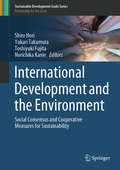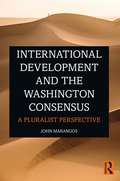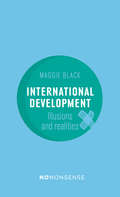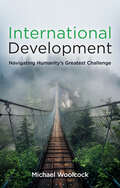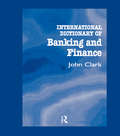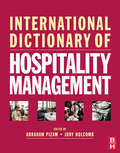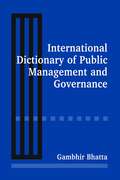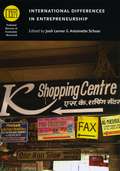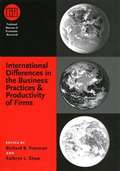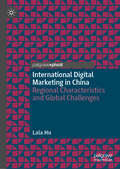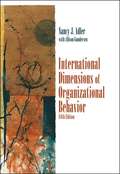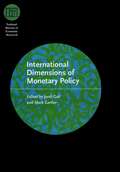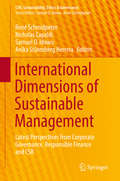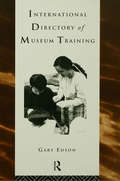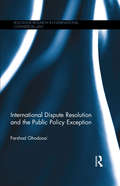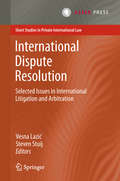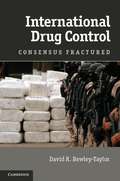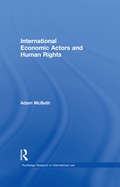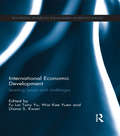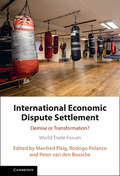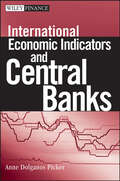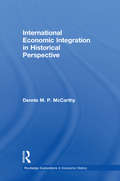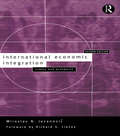- Table View
- List View
International Development and the Environment: Social Consensus and Cooperative Measures for Sustainability (Sustainable Development Goals Series)
by Toshiyuki Fujita Shiro Hori Yukari Takamura Norichika KanieThis book analyzes the interplay between development and the environment, focusing on how to forge social consensus and practices in the international community. Since the Rio Earth Summit in 1992, sustainable development has increasingly attracted the attention of the international community, and several international agreements have been concluded to combat issues such as climate change. The Sustainable Development Goals (SDGs) were introduced as common objectives, and the Paris Agreement was adopted as a subsequent outcome. In light of today’s globalized world, how to best achieve sustainable development—and prioritize climate change in particular—is an issue involving various perspectives on the environment and economic development in the global community.The book provides students, businesspeople and government officials with a concept of sustainable development that is based on using social consensus, social norms, and practices (cooperative global actions) to achieve common goals. It is divided into three parts, the first of which focuses on the goals and development needed to achieve sustainable development. The second part explores measures to promote sustainable development, while the third highlights current climate change issues and aspects related to the effective implementation of international frameworks.
International Development and the Washington Consensus: A Pluralist Perspective
by John MarangosIn this book, John Marangos offers an insightful analytical and theoretical review of the Washington Consensus and its successors among the mainstream. Following an intuitive structure, it explores international development and the Washington Consensus, as a critique through the lenses of Neoclassical economics, Post Keynesian economics, Institutional economics, and Marxist economics. Ultimately, it provides a compelling alternative perspective to the dominant development paradigm, and enables readers to identify the interconnections, interrelationships, and intercontradictions between different frameworks and policies. It will be a valuable supplementary reading for students, researchers, and policymakers in international development, development economics, heterodox economics, and the history of economic thought.
International Development: Illusions and Realities (No-Nonsense Guides #36)
by Maggie BlackThe idea of reducing poverty and inequality and improving health, education, and job opportunities around the world is beyond criticism. Yet, the reality of development can often be confusion, contradiction, deceit, and corruption. This fully updated third edition makes a major contribution to the ongoing debate about the effectiveness of aid and development. Drawing on a wide range of sources, from international studies to personal stories, Maggie Black brings objective analysis and valuable insights to all the key themes. And she presents a forceful argument for bringing the poor and marginalised into the heart of the process.
International Development: Navigating Humanity's Greatest Challenge
by Michael WoolcockWhether understood as a long-run historical process or an intentional political project, international development transforms not only societies and economies but also key ideas about how the world works and how problems should be solved. In this compelling book, Michael Woolcock demonstrates that achieving peace and prosperity for all is supremely contingent and often contentious: the means and ends of development are often perceived as alien, unjust, and disruptive, its benefits and costs unequally borne. Many development challenges are not technical problems amenable to an expert’s solution, but require extensive deliberation to find and fit context-specific responses. Woolcock insists that it is each generation’s challenge to find shared, legitimate, and durable solutions to the moral imperative to reduce human suffering while simultaneously redressing the challenges that development success (let alone failure) inexorably brings. This skillful guide will be essential reading for students and practitioners working in this complex field, and for anyone seeking to help “make the world a better place.”
International Dictionary of Banking and Finance (International Dictionary Ser.)
by John ClarkSimple, concise, and up-to-date, the International Dictionary of Banking and Finance lists thousands of key words, terms, acronyms, and proper names that bankers, financial managers, students, and business teachers use every day. Arranged in alphabetical order, the terms are precisely defined--so that readers may comprehend the meanings in terms of daily business activities or study. Designed with the student as well as the executive in mind, the Dictionary includes terms and concepts from around the world, and it cross-references related terms to provide insight and clarification. Subjects covered include: investments; finance; commercial and mortgage banking; exporting; business structure; and a host of other broad business categories.
International Dictionary of Hospitality Management
by Abraham Pizam Judy HolcombThe International Dictionary of Hospitality Management is the must have companion for all those working or studying in the field of hospitality management. With over 728 entries, it covers everything you need to know, from a concise definition of back office systems, to management accounting and yield management.It covers all of the relevant issues in the field of hospitality management from both a sectoral level:* Lodging* Restaurants and Food service* Time-share* Clubs* EventsAs well as a functional one:* Accounting and Finance* Marketing* Strategic Management* Human Resources* Information Technology* Facilities ManagementAn abridged version of the successful International Encyclopedia of Hospitality Management, its user friendly layout provides readers with quick and concise answers across this diverse area of industry.
International Dictionary of Insurance and Finance (International Dictionary Ser.)
by John ClarkFirst Published in 1999. Routledge is an imprint of Taylor & Francis, an informa company.
International Dictionary of Public Management and Governance
by Gambhir BhattaThis authoritative, up-to-date resource will become the standard reference on the theory and practice of public management around the world. Public management addresses strategy, policy processes, and governance as well as the bureaucratic concerns of public administration. Reflecting this diversity, the Dictionary incorporates concepts from various other fields including economics, political science, management, sociology, and psychology. The reference draws from an extensive literature base including books, journals, websites, research reports, government proceedings, legal documents, and international and organizational reports. As the primary source of ready information for students, researchers, scholars, and practitioners, it defines all the fundamental concepts of public management, their applications, and all relevant theories, complete with sources and references.
International Differences in Entrepreneurship
by Josh Lerner Antoinette SchoarOften considered one of the major forces behind economic growth and development, the entrepreneurial firm can accelerate the speed of innovation and dissemination of new technologies, thus increasing a country's competitive edge in the global market. As a result, cultivating a strong culture of entrepreneurial thinking has become a primary goal throughout the world. Surprisingly, there has been little systematic research or comparative analysis to show how the growth of entrepreneurship differs among countries in various stages of development. International Differences in Entrepreneurship fills this void by explaining how a country's institutional differences, cultural considerations, and personal characteristics can affect the role that entrepreneurs play in its economy. Developing an understanding of the origins of entrepreneurs as well as the choices they make and the complexity of their activities across countries and industries are of central importance to this volume. In addition, contributors consider how environmental factors of individual economies, such as market regulation, government subsidies for banks, and support for entrepreneurial culture affect the industry and the impact that entrepreneurs have on growth in developing nations.
International Differences in the Business Practices and Productivity of Firms
by Kathryn Shaw Richard B. FreemanIn recent years, globalization and the expansion of information technologies have reshaped managerial practices, forcing multinational firms to adjust business practices to different environments and domestic companies to adjust to their foreign competitors. In International Differences in the Business Practices and Productivity of Firms, a distinguished group of contributors examines the phenomenon of widespread differences in managerial practices across firms, establishments within firms, and countries. This volume brings together eight studies that combine qualitative and quantitative insider analysis of business practices such as the use of teams, incentive pay, lean manufacturing, and quality control, revealing the elements that determine which practices are adopted and why. International Differences in the Business Practices and Productivity of Firms offers a much-needed model for measuring the productivity and performance of international firms in a fast-paced global economy.
International Digital Marketing in China: Regional Characteristics and Global Challenges
by Lala HuThis book examines key issues in international digital marketing in China from a theoretical and empirical perspective. Divided into two main parts, it begins with an analysis of China’s cultural characteristics and business environment, with a particular emphasis on the Chinese digital context. The book goes on to present original empirical studies and an investigation into recent challenges and opportunities for international firms in the fashion sector. With nearly 900 million internet users and an e-commerce market volume of over one thousand billion US dollars, China is the world's largest digital market. While this creates significant opportunities for international firms, there are many factors to consider when approaching this market. In order to understand the Chinese digital scenario, the book analyzes the characteristics of local internet platforms and consumer patterns. The book also presents a real-world case study on a luxury retail firm operating in China, Florentia Village, and the results from a questionnaire on Chinese mobile shoppers. On this basis, it provides a conceptual framework and discusses the theoretical and managerial implications for international firms operating in China, making it an enlightening book for scholars, students, and practitioners alike.
International Dimensions Of Organizational Behavior (Fifth Edition)
by Nancy J. Adler Allison GundersenThe world of organizations is no longer defined by national boundaries. INTERNATIONAL DIMENSIONS OF ORGANIZATIONAL BEHAVIOR breaks down the conceptual, theoretical, and practical boundaries limiting our ability to understand and work with people in countries and cultures around the world. Adler's hallmark approach views global complexity as neither unpredictable nor random; rather, she demonstrates that variations across cultures and their impacts on organizations follow systematic, predictable patterns. The authors' blend of substance and readability--including a wealth of research and examples from around the world--results in a text that is authoritative and richly detailed.
International Dimensions of Monetary Policy
by Mark Gertler Jordi GalíUnited States monetary policy has traditionally been modeled under the assumption that the domestic economy is immune to international factors and exogenous shocks. Such an assumption is increasingly unrealistic in the age of integrated capital markets, tightened links between national economies, and reduced trading costs. International Dimensions of Monetary Policy brings together fresh research to address the repercussions of the continuing evolution toward globalization for the conduct of monetary policy. In this comprehensive book, the authors examine the real and potential effects of increased openness and exposure to international economic dynamics from a variety of perspectives. Their findings reveal that central banks continue to influence decisively domestic economic outcomes--even inflation--suggesting that international factors may have a limited role in national performance. International Dimensions of Monetary Policy will lead the way in analyzing monetary policy measures in complex economies.
International Dimensions of Sustainable Management: Latest Perspectives from Corporate Governance, Responsible Finance and CSR (CSR, Sustainability, Ethics & Governance)
by Nicholas Capaldi Samuel O. Idowu René Schmidpeter Anika Stürenberg HerreraThis book provides a rich collection of essays discussing and showcasing the transformation of businesses around the world towards sustainability and responsibility. Based on a framework of global theoretical approaches, it presents practical examples and cases from a variety of industries, regions and corporate functions. It also highlights the latest insights on how corporations consider sustainability in the governance of their respective organization. Furthermore, the book features a section dedicated to responsible finance, and outlines business and management-driven approaches that contradict the traditionally held belief that a trade-off exists between sustainability, social responsibility and profit.
International Directory of Museum Training: Programs and practices of the museum profession (Heritage: Care-Preservation-Management)
by Gary EdsonChoosing the right museum training course may be one of the most important decisions a person makes in their career. Whether you are already working in a museum or are just beginning training you will need the most comprehensive and up-to-date information. The International Directory of Museum Training provides a list of museum training programmes worldwide with detailed information about each course. Every entry contains information about subjects offered, numbers of students, scholarship opportunities, and contact names and addresses. International Directory of Museum Training is co-published with ICTOP, the training committee of ICOM. It is the successor to the widely recognised Museum Studies International, last published in 1988. This completely new and fully updated volume enhances the qualities of the earlier publication and updates the presentation to make the volume easier to use. This is an essential reference book for all who are hoping to develop a career in museum work or to enhance their professional qualifications.
International Dispute Resolution and the Public Policy Exception (Routledge Research in International Commercial Law)
by Farshad GhodoosiDespite the unprecedented growth of arbitration and other means of ADR in treaties and transnational contracts in recent years, there remains no clearly defined mechanism for control of the system. One of the oldest yet largely marginalized concepts in law is the public policy exception. This doctrine grants discretion to courts to set aside private legal arrangements, including arbitration, which might be considered harmful to the "public". The exceptional and vague nature of the doctrine, along with the strong push of actors in dispute resolution, has transformed it, in certain jurisdictions, to a toothless doctrine. At the international level, the notion of transnational public policy has been devised in order to capture norms that are "truly" transnational and amenable for application in cross-border litigations. Yet, despite the importance of this discussion—a safety valve and a control mechanism for today’s international and domestic international dispute resolution— no major study has ventured to review and analyze it. This book provides a historical, theoretical and practical background on public policy in dispute resolution with a focus on cross-border and transnational disputes. Farshad Ghodoosi argues that courts should adopt a more systemic approach to public policy while rejecting notions such as transnational public policy, which limits the application of those norms with mandatory nature. Contrary to the current trend, the book invites the reader to re-conceptualize the role of public policy, and transnational dispute resolution, in order to have more sustainable, fair and efficient mechanisms for resolving disputes outside of national courts. The book sheds light on one of the most important yet often-neglected control mechanisms of today’s international dispute resolution and will be of particular interest to students and academics in the fields of International Investment Law, International Trade Law, Business and Economics.
International Dispute Resolution: Selected Issues in International Litigation and Arbitration (Short Studies in Private International Law)
by Vesna Lazić Steven StuijThe contributions in this book cover a wide range of topics within modern disputeresolution, which can be summarised as follows: harmonisation, enforcement andalternative dispute resolution. In particular, it looks into the impact of harmonisedEU law on national rules of civil procedure and addresses the lack of harmonisationin the US regarding the recognition and enforcement of foreign judgments. Furthermore,the law on enforcement is examined, not only by focusing on US law, but also onhow to attach assets in order to enforce a judgment. Finally, it addresses certain typesof alternative dispute resolution. In addition, the book looks into the systems andcultures of dispute resolution in several regions of the world, such as the EU, the US andChina, that have a high impact on globalisation. Hence, the book is diverse in the senseof dealing with multiple issues in the field of modern dispute resolution.The book offers explorations of the impact of international rules and EU law on domesticcivil procedure, through case studies from, among others, the US, China, Belgium andthe Netherlands. The relevance of EU law for the national debate and its impact on theregulation of civil procedure is also considered. Furthermore, several contributions discussthe necessity and possibility of harmonisation in the emergency arbitrator mechanisms inthe EU. The harmonisation of private international law rules within the EU, particularlythose of a procedural nature, is juxtaposed to the lack thereof in the US. Also, the bookoffers an overview of the current dispute settlement mechanisms in China.The publication is primarily meant for legal academics in private international law andcivil procedure. It will also prove useful to practitioners regularly engaged in cross-borderdispute resolution and will be of added value to advanced students, as well as to those withan interest in international litigation and more generally in the area of dispute resolution.Vesna Lazić is Senior Researcher at the T.M.C. Asser Institute, Associate Professor ofPrivate Law at Utrecht University and Professor of European Civil Procedure at theUniversity of Rijeka.Steven Stuij is an expert in Private International Law and a PhD Candidate/GuestResearcher at the Erasmus School of Law, Rotterdam.Ton Jongbloed is Guest Editor on this volume.
International Drug Control
by David R. Bewley-TaylorThere remains substantial agreement among the international community on many aspects of the contemporary UN drug control regime. However, diverging views on the non-medical and non-scientific use of a range of controlled substances make drug policy an increasingly contested and transitionary field of multinational cooperation. Employing a fine-grained and interdisciplinary approach, this book provides the first integrated analysis of the sources, manifestations and sometimes paradoxical implications of this divergence. The author develops an original explanatory framework through which to understand better the dynamic and tense intersection between policy shifts at varying levels of governance and the regime's core prohibitive norm. Highlighting the centrality of the harm reduction approach and tolerant cannabis policies to an ongoing process of regime transformation, this book examines the efforts of those actors seeking to defend the existing international control framework and explores rationales and scenarios which may lead to the international community moving beyond it.
International Economic Actors and Human Rights (Routledge Research in International Law)
by Adam McBethIn noting that the actions of entities other than states in the economic arena can and often do have a profound effect on human rights, this book poses the question as to how international human rights law can and should address that situation. This book takes three very different categories of international actor – the World Trade Organization, the international financial institutions (World Bank and IMF) and multinational enterprises – and analyses the interaction of each category with human rights, in each case analysing the interaction of the different fields of law and seeking to identify a role for international human rights law. Adam McBeth concludes that each of the selected international economic actors can and should be considered to operate within a holistic system of international law, including human rights obligations, but that changes in the operations and the accountability mechanisms for each actor are necessary for the practical implementation of that approach. While written from a human rights perspective, the underlying theme of the book is one of engagement and harmonisation rather than condemnation. It provides valuable insight for those who approach this topic from a background of international trade law, commercial law or general international law, just as much as those who have a human rights background. International Economic Actors and Human Rights will be of great interest to those studying or working in any field of international economic law, as well as human rights scholars and practitioners.
International Economic Development: Leading Issues and Challenges (Routledge Studies In The Modern World Economy)
by Diana S. Kwan Fu Lai Tony Yu Wai Kee YuenWritten by experts in their respective areas, this book is an excellent review of theories, policies and empirical evidences on important topics in global economic development. The book is both a superb teaching tool and a valuable handbook in development economics. The volume compiled 13 articles on contemporary issues influencing the world development. The book covers issues ranging from global financial crisis, the rise of China and the world economic order, multinational corporations, sweat factories and social responsibilities to Japan's nuclear meltdown and sustainable development. The book highlights the impacts of globalization on human well-being and examines the relationship between developed and developing economies in the global perspective. With cases and box illustration, this book is an essential reader for undergraduate students in economic development, international development and development economics. It is also a great reference for more advanced students, as well as a very useful guide to policymakers and practitioners interested in recent advances in global development.
International Economic Dispute Settlement: Demise or Transformation?
by Manfred Elsig Van den Bossche, Peter Rodrigo PolancoThe post-Cold War era has seen an unprecedented move towards more legalization in international cooperation and a growth of third-party dispute settlement systems. WTO panels, the Appellate Body and investor-state dispute settlement cases have received increasing attention beyond the core trade and investment constituencies within governments. Scrutiny by business, civil society, academia, and trade and investment experts has been on the rise. This book asks whether we observe a transformation or a demise of existing institutions and mechanisms to adjudicate disputes over trade or investment. It makes a contribution to the question in which direction international economic dispute settlement is heading in times of change, uncertainty and increasing economic nationalism. In order to do so, it brings together chapters written by leading researchers and experts in law and political science to address the challenges of settling disputes in the global economy and to sketch possible scenarios ahead of us.
International Economic Indicators and Central Banks (Wiley Finance Ser. #392)
by Anne Dolganos PickerPraise for International Economic Indicators and Central Banks "Anne Picker's International Economic Indicators and Central Banks is a tour de force. It brings together a wealth of information, explanation, and guidance, which has hitherto only been available from disparate and frequently obscure sources, and does so with great clarity and authority. It will be an invaluable resource not only for investors but for all others involved in the fields of finance and economics." --Donald R. Anderson, OBE FRSE (UK), International Economics Advisor, formerly chief economist, Courtaulds Group "Picker's book provides a comprehensive and up-to-date guide to the workings of key central banks, and to the economic data that informs their thinking and policy formation. The book should be required reading for those with more than a passing interest in financial markets and monetary policy formation." --George Worthington, Chief Economist, Asia Pacific, Thomson-IFR (Australia) "International Economic Indicators and Central Banks is an invaluable guide for anyone doing business overseas or investing in international markets. It is thorough and precise enough for professional economists yet readily accessible to business people and investors. Anne Picker is not only an excellent communicator who demystifies central bank operations and technical economic indicators; she is also a top-notch economist with extensive experience in analyzing them. Don't read any international economic analysis without this volume close at hand." --David A. Levy, Chairman, The Jerome Levy Forecasting Center
International Economic Integration in Historical Perspective (Routledge Explorations in Economic History)
by Dennis Patrick McCarthyInternational economic integration is not a recent phenomenon; its roots can be traced back to the Roman Empire. This informative volume departs from the conventional short-term analysis and takes a long-term view of the process, offering perspectives that are both detailed and diverse. Author Dennis McCarthy examines seven types of organizations that exemplify international economic integration (colonial empires, merchant associations, religious empires, criminal empires, free trade areas, customs unions and common markets), and representative examples of each type are analyzed in a comparative framework. Timely and unique, this book demonstrates that international economic integration is an economic and political process that also involves political economy. With an introduction defining key terms and concepts; a retrospective summarizing the main insights, and endnotes and a detailed bibliography offering readers ways to pursue these topics further, McCarthy’s book will prove indispensable to students and general readers who wish to gain a firm understanding of international economics and the processes that shape the world today.
International Economic Integration: Limits and Prospects
by Miroslav JovanovicThis new edition of International Economic Integration, has been fully revised and updated to reflect current developments in this increasingly important area. New features include: * Completely new introduction and conclusion * Chapter added on integration schemes which includes discussion of the East and the enlargement of the European Union * Chapter on the Common Market expanded to include new developments in capital mobility and industrial policy * new real life examples, quanitative studies and statistical material * Treatment of issues even more accessible following feedback from first edition Building on the reputation of the highly successful first edition, this volume will continue to be considered the definitive work on the subject and to be a vital reference for students of international economics.
International Economic Law after the Global Crisis
by C. L. Lim Bryan MercurioThis collection explores the theme of fragmentation within international economic law as the world emerges from the 2008 global financial crisis, the subsequent recession and the European sovereign debt crisis which began in early 2010. The post-crisis 'moment' itself forms a contemporary backdrop to the book's focus on fragmentation as it traces the evolution of the international economic system from the original Bretton Woods design in the aftermath of the Second World War to the present time. The volume covers issues concerning monetary cooperation, trade and finance, trade and its linkages, international investment law, intellectual property protection and climate change. By connecting a broad, cross-disciplinary survey of international economic law with contemporary debate over international norm and authority fragmentation, the book demonstrates that this has been essentially a fragmented and multi-focal system of international economic regulation.
